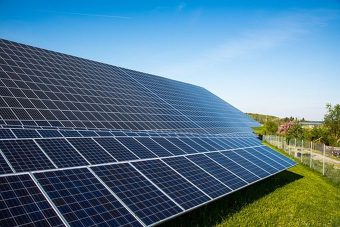
International manufacturers sent twice as many solar cells and modules to the US in November 2017 as November 2016. Solar panel importers are looking to capitalize on the robust market fundamentals ahead of potential future tariffs, ArsTechnica reported.
President Trump’s administration will reach a decision about solar cell and solar panel imports around January 26th. As a reminder, the potential penalty would not be due to any illegal trade practices, such as dumping. Rather, the challenge originated based on an obscure law that allowed the US to impose tariffs on low-cost imports if those imports hurt US manufacturers that couldn’t profit at such low market prices.
Last September, the International Trade Commission (ITC) ruled that a couple of US solar manufacturers were indeed hurt by lower cost solar cells and modules produced by global manufacturers. (Ironically, one of the two US manufacturers represented is actually a subsidiary of a Chinese company, and the parent company in China opposed the case. The other “US manufacturer” is a subsidiary of a German company.)
President Trump’s administration can decide to impose tariffs on imported solar technology as long as the ITC suggests the imports can destroy US industries. The ITC is recommending strict tariffs on solar cells and modules, 30% on large cells and 35% on imported modules.
However, tariffs may have a negative impact on a growing solar energy market.
The vast bulk of the 260,000 solar jobs in the US are not in manufacturing. They are in installation, sales, etc. Significantly raising the costs of common solar technologies would cut into the compelling market case for going solar, so would hurt and even destroy many of those jobs.
There are indeed 38,000 solar manufacturing jobs in the United States, but most of those are for tech-leading solar companies that offer higher cost solar cells and panels that serve a certain portion of the market. Those companies are unlikely to see much benefit from tariffs on imported solar cells and panels that almost completely compete on low cost (not higher efficiency or advantages in certain climates or applications).
In 2016, global solar power installations grew by 50%, with China providing nearly half of the growth, according to the International Energy Agency. Meanwhile, 2016 US installations alone increased over 95%. However, 3rd quarter 2017 results saw the USA’s lowest new installation results in two years, with 2 gigawatts (GW) installed, while growth in China, India, and other leading markets seemed to remain strong.
Despite the looming trade tariff clouds, there may be a glimmer of hope. Despite ITC recommendations for President Trump to slap tariffs on the solar industry, at the World Trade Organization level, there may be a challenge. ArsTechnica said a business must have proof global competition hit them unexpectedly, which may not have been honestly predicted. US rules only need companies to show they were hurt, something that doesn’t line up with the global rules (and perhaps a reason why this relief for US manufacturers has almost never been pursued). Every time similar tariffs have been fought at the WTO level, they have lost.
While tariffs may be useful in helping homegrown companies, many right-leaning groups as well as the renewable energy industry are opposed to the tariffs, as they reduce free market competition while increasing otherwise low-cost solar. ArsTechnica writes:
“Oddly enough, the tariffs are opposed not just by the wider renewable energy industry, but by many Trump-supporting, right-leaning groups. They claim tariffs would muddy a free market while the industry argues that it has benefitted from being able to sell low-cost panels to residential solar customers.”
With the solar industry creating jobs 17 times faster than most of the economy, imposing such tariffs in a changing energy landscape in 2018 is not worth the economic risk (let alone the environmental harm that would result). Given the acceleration seen in solar energy, and the inevitable decline of the coal industry, tariffs would do far more harm in the long run compared to any short gains seen to those American manufacturers impacted. Well, even in the short run, tariffs would likely harm the US economy.
Source: cleantechnica.com

